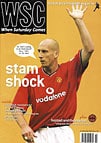 Sam Beckwith remembers the 1997 Czech cup final between Dukla Prague and Slavia Prague which started Dukla's fall from grace
Sam Beckwith remembers the 1997 Czech cup final between Dukla Prague and Slavia Prague which started Dukla's fall from grace
There’s a growing trend to sentimentalise the years of communist rule in the Czech Republic, with propaganda-bedecked cafes popping up on Prague streets and old newsreels running on TV. So far, however, Dukla Prague have escaped the trend. One of Czech football’s most famous names disappeared in 1997 with more of a whimper than a bang, and there are few signs that it’s about to be rehabilitated.
While Prague’s four other teams maintained distinct historical identities despite Communist Party interference, Dukla – the army team, founded in 1948 – were too closely linked with the regime to inspire fond feelings. The club won 11 Czechoslovak league titles and utterly dominated the 1960s but, contrary to international perceptions, never came close to matching the achievements or popularity of city rivals Sparta.
The fact that Dukla’s home, the Juliska athletics stadium, was a terrible place to watch football didn’t help them win friends. Part of an army sports facility in the well-to-do Dejvice district, a wicked wind tore through the open-ended stadium in the winter. It’s hard to imagine much of an atmosphere, even on those occasions when the monstrous grandstand was full.
The end of the communist regime spelled the end for the old Dukla. The army set the football club adrift in 1994, with swift and disastrous consequences. The newly discharged Dukla were promptly relegated to the second division where money problems meant the club was unable to pay its registration fee for the following season. A further relegation, to the wilderness of the Czech third division, followed and the once-great club teetered on the brink of extinction.
Dukla were not the only Czech club to face financial disaster, however. Second-division FC Pribram faced similar difficulties. Scenting an opportunity, Dukla’s entrepreneurial new owner, Bohumir Duricko, bought up Pribram and merged the two clubs, vaulting Dukla’s name back into the second division. They enjoyed a memorable 1996-97 season, taking the second division title at a canter, and beating four first division opponents in the cup. That run set up a Prague derby final with Slavia, reigning champions and UEFA Cup semi-finalists the season before.
Prior to the game, Dukla’s owners announced that the club would be cutting its ties with Prague and moving 50 miles south-west to the greener pastures of Pribram – a pleasant little city, if you can overlook the fact that its uranium mines were once used as labour camps for political prisoners. The move made commercial sense, as Pribram’s football-starved fans would welcome the club with far more enthusiasm than Prague could muster.
An emotionally charged final seemed guaranteed. Prague’s football nostalgics would surely rise up in their thousands to cheer the famous name into the history books and Dukla would fight to the death against their talented opponents, leaving Prague on a high. Sadly, Czech cup football rarely works like that. Despite offering a highly valued path into Europe, the Pohar CMFS is astonishingly low-key, and the final, played at the Strahov stadium complex, is no exception.
The game usually takes place on a Wednesday afternoon at the neglected national football stadium, the 20,000-capacity Evzen Rosicky. The inconvenient time, the hellish uphill journey to the stadium and the monstrous scale of the place combine to create a highly unattractive event. A Czech friend dismissed the usual attendance as “a handful of off-duty soldiers and pensioners” and that’s only a slight exaggeration. The Rosicky is rarely half full on cup final day.
Despite the presence of two Prague teams and the historical significance of the game, 1997’s final followed the usual pattern, and a mind-numbingly tedious game did little to raise the spirits of the 8,236 fans that trekked up to Strahov. Slavia, stripped of their biggest names after Euro 96 and with a European place already sewn up, seemed uninterested, while Dukla looked like a tired second division team rather than potential giant killers. Slavia striker Karel Vacha’s 101st minute golden goal winner finally ended the misery. In the end, Dukla’s final minutes as a Prague team were greeted more with relief than with sorrow.
Since then, more ties with the past have been cut. After a season as FC Dukla, the team was renamed Dukla Pribram in 1998, then last year (when they met Aston Villa in the Intertoto Cup) the club adopted the name of a sponsor, food wholesaler Marila. Dukla, named after a valley in eastern Slovakia where Soviet and Czechoslovak soldiers fought a bloody battle with German forces in 1944, has given way to a name more commonly seen on coffee cups and sugar packets. The new, more mundane corporate identity might not be as appealing to foreign enthusiasts, but in a country with a recent history that’s been rather too colourful it’s almost a refreshing change.
From WSC 176 October 2001. What was happening this month